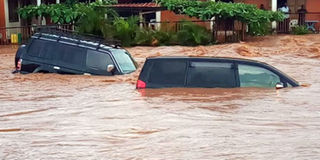We need health and the environment to survive

Cars submerged by the floods in Mukono on June 8, 2019. FILE PHOTO
What you need to know:
- As Uganda and the world continue the war on COVID-19, our response must be wholesome, focusing also around two poles: SDG 3 on Wellbeing and SDG 13 on Climate Action.
- Creating the foundation for a new real economy must include action to promote social, financial and physical security, if we are to Leave No One Behind in our quest for survival and prosperity.
On World Environment Day today, we would like you to stop and ask: Why is the environment important? How does its destruction impact our health, quality of life and survival on planet Earth? As the world focuses on rapidly identifying measures, technologies and solutions to manage and mitigate a new pandemic, COVID-19, we must also focus on taking urgent action to protect, nurture and cohabitate with the environment. Our existence depends on the existence of nature.
Our failure to do so, has changed the lives of many, as we have witnessed in recent weeks. Lake Victoria has risen to highest levels in living memory, destroying homes near the shores and increasing the likelihood of outbreaks of waterborne diseases such as cholera among communities in wetlands in around the lake.
Elsewhere in the country, we have witnessed torrential rains leading to flooding notably along River Nyamwamba in Kasese District, while landslides in mountainous areas particularly in Bundibugyo and Bududa districts have destroyed homes and gardens, eroding food security for many households. These disasters have now become annual occurrences, which require urgent preventive and corrective action by each one of us to save lives and protect livelihoods.
In his message for World Environment Day, UN Secretary-General, António Guterres warns, “We are harming the world to our own detriment. The environment is breaking down. One million species risk extinction. Climate change is worsening. And now a coronavirus has jumped from nature to people, reaping havoc. To care for humanity, we MUST care for nature.”
Uganda has a vision to become a prosperous and modern nation. She also has a commitment to invest in people, the planet and our shared prosperity using the Sustainable Development Goals.
As Uganda and the world continue the war on COVID-19, our response must be wholesome, focusing also around two poles: SDG 3 on Wellbeing and SDG 13 on Climate Action. Creating the foundation for a new real economy must include action to promote social, financial and physical security, if we are to Leave No One Behind in our quest for survival and prosperity.
Unprecedented times call for unprecedented measures. We are faced with COVID-19, flooding, hunger, locusts, poverty, violence and gender inequality. It is against this background that the United Nations, in partnership with Government, non-governmental organisations (NGOs) and the Uganda Red Cross Society, launched an emergency appeal in April for US$ 316.4 million focusing on direct mitigation and response to the impacts of COVID-19 over a period of six months, April to September, targeting 12.8 million people.
The appeal addresses healthcare, food, nutrition and income generation; social services; refugees and displacement; and reinvigoration of the economy and digital innovation. With some $30 million mobilized so far, this appeal provides an opportunity to scale up support for the most vulnerable affected by COVID-19 and lockdown measures, including the poor, those affected by natural disasters or in need of asylum.
We would like to take this opportunity to thank all those at the frontline providing much needed humanitarian relief. We also want to call upon the Government, and other stakeholders including NGOs, private sector and influencers to take firm action to address the root causes of environmental disasters.
Trees should be planted on riverbanks and steep slopes. We should not farm on steep slopes. Communities should practice good farming methods such as terracing and contour ploughing. Protecting wetlands including around Lake Victoria, should become a shared national priority promoted by cultural institutions, religious leaders, private sector and civil society. We must protect rivers, forests, wetlands as a foundation to ensure the safety and wellbeing of people. This is the path to social, economic and physical security.
The focus of World Environment Day (June 5) this year is biodiversity. It is time to put nature at the epicentre of decision making on the new real economy, on urbanization and becoming a modern society. Our traditions of shared humanity, or Ubuntu, call for harmony with nature. This is a global, African and Ugandan priority.
One of the easiest disaster risk reduction measures we can take is to empower children and youth to actively be involved in disaster risk reduction and contribute to making their cites and community resilient.
We call on all individuals, communities, institutions and organizations to take firm action to salvage the environment. What are you doing to mark World Environment Day today?
Rosa Malango is the UN Resident Coordinator and Designated Official for Security
Vanessa Nakate is a Ugandan climate justice activist
Edwin Muhumuza is the Executive Director of Youth Go Green




